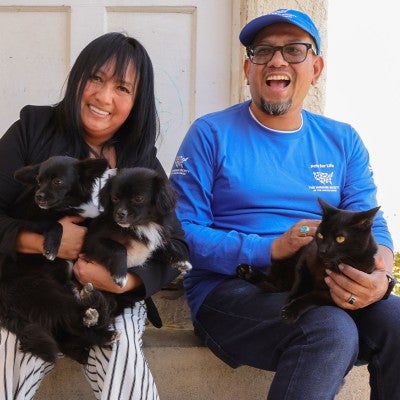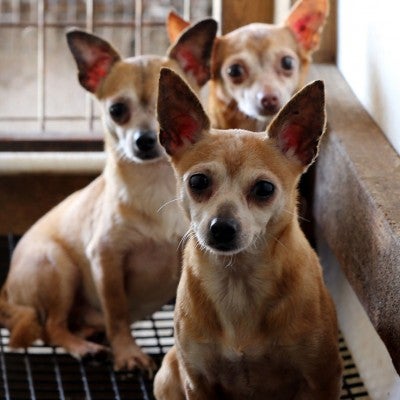The Humane Society family of organizations is committed to diversity, equity and inclusion to build a stronger, more inclusive animal protection movement where all people can have a sense of belonging.
Through our global DEI initiatives, we:
- Provide direct care services for people and pets in historically marginalized and underserved communities.
- Design culturally competent outreach and program strategies and advocate for inclusive policies that increase access to pet care services for all.
- Develop inclusive animal welfare leaders through education and training, and strive to build a more inclusive organizational workplace culture.
Learn more about our work
- Serving communities that need us most
- U.S.-based efforts
- Global efforts
- Designing culturally competent strategies
- Advocating for inclusive policies
- Developing inclusive animal welfare leaders
- Building a more inclusive organizational culture
Serving communities that need us most
We work to ensure underserved communities have accessible care for their pets by providing a comprehensive support system through our global direct care programs. Through our U.S.-based work providing access to care and our efforts around the world, we address the inequity and lack of access to companion animal resources by providing services such as veterinary care, spay/neuter, grooming, behavioral training, pet fees/deposits for housing, pet supplies and more. Our programs operate in over 60 locations, across 50 countries and include major metropolitan areas, small towns, and rural and Native communities, serving thousands of animals and their families every year.
Global efforts
Advancing the welfare of animals in more than 50 countries, Humane Society International works around the globe to protect animals and promote the human-animal bond in under-resourced communities. These are just a few examples of our work.
Bolivia: Our veterinary training program in Bolivia is the first of its kind in Latin America, designed to improve access to humane spay/neuter services in under-resourced communities across the region. This program trains an average of 20 surgeons and 20 technicians a year. It sterilizes and vaccinates about 4,500 animals each year.
Chile: To date, our program offering affordable and accessible veterinary services has reached more than 45,000 animals in some of the most remote areas of the country. In addition, our disaster response team provided relief from recent devastating wildfires, caring for close to 500 animals and helping reunite displaced pets with their families.
India: Through our community engagement work, more than 35,000 people in under-resourced communities have brought animals for spay/neuter services. We have served approximately 30,000 animals per year through dog population management programs, mass vaccination campaigns and mobile veterinary clinics.
Mexico: We are implementing a new program pilot focused on training vets in high-quality, low-cost spay/neuter techniques, providing preventative veterinary services via mobile clinics in five under-resourced communities, and conducting community outreach on responsible pet ownership and humane treatment of animals.
Romania: We work with local partners to provide spay/neuter and lifesaving care to over 2,000 companion animals and preventive services to thousands more animals each year in shelters and isolated areas experiencing extreme poverty.
South Africa: Our Healthy Animals, Healthier Communities project in underserved communities has provided spay/neuter surgeries for approximately 1,500 dogs and cats, as well as preventive and wound care for an additional 2,000 animals, since December 2022. We also provide education on humane animal welfare and responsible pet ownership for 3,500 students and 30 teachers across six local schools.
Developing inclusive animal welfare leaders
We are weaving inclusion into all of our educational offerings and trainings to ensure our programming reflects the diverse communities we serve. We are committed to partnering with organizations to provide educational resources that address animal welfare issues from a culturally competent lens.
Spotlight on inclusion: We have developed a content category called "Spotlight on Inclusion" for our signature events, Animal Care Expo and Taking Action For Animals, and webinars. This content focuses on how diversity, equity and inclusion have a direct impact on the success of our mission to help all animals. It addresses topics such as increasing equity in access-to-care services, community-centric programs and community-based solutions that are inclusive of underserved, underrepresented, and historically marginalized communities to create a more diverse, just and fair animal welfare movement.
Speaker directory: We are intentional about including a wide range of perspectives that reflect the diverse communities we serve. Our Spotlight on Inclusion Speaker Directory is designed to further amplify the voices of speakers who identify as Black, Indigenous or a person of color to ensure that communities that are historically marginalized and underrepresented in animal welfare are given a platform to share their lived experiences
DEI webinar series: We host an annual DEI webinar series for our staff, volunteers and shelter partners that covers a range of topics to build cultural competency in animal welfare and address the impact of income disparities, housing instability and cultural norms on our work to protect animals and the communities we serve.
DEI Trailblazers in Animal Welfare Award: This award recognizes the unsung heroes in animal protection who are breaking barriers and forging new paths toward a more equitable and inclusive animal protection movement. Recipients increase the presence of racial and ethnic minorities, women, LGBTQ+ people, people with disabilities, people of marginalized socioeconomic status and other underrepresented groups at all levels of the animal welfare movement.
Veterinary webinar series and trainings: We support well-being and diversity in the veterinary profession through continuing education training offered through our Humane Society Veterinary Medical Association. Webinars are hosted by a diverse range of veterinary professionals and include topics such as Cultivating and Leading a Diverse, Equitable and Inclusive Culture in Veterinary Medicine as well as Practicing Veterinary Medicine with Cultural Humility.
Compassionate Care scholarships for veterinary students: We offer scholarships to support efforts to expand access to veterinary care in underserved communities and to promote diverse representation within the veterinary profession itself. In 2023, we awarded five $10,000 scholarships to individuals who demonstrated this commitment.
HSVMA Speakers Bureau: The HSVMA Speakers Bureau provides animal welfare-related presentations to veterinary students on veterinary school campuses. Among the presentations offered through this program is Why Access to Care Resources is a Social Justice Issue, shared by our Pets for Life staff. This is an opportunity for veterinary students to learn how institutional bias and systemic inequality impact pets and the veterinary profession.
Our Law Enforcement Training Center: We work with animal care and control officers and local law enforcement to develop community-based interventions through our training program. This workshop incorporates implicit bias content because community policing and animal protection can play a critical role in fostering trust between law enforcement and the communities they serve.
Building a more inclusive organizational culture
DEI is an organizational priority, and inclusion is one of our core values. Our goal is to provide our colleagues with a world-class working environment and organizational culture where everyone is welcome and feels a sense of belonging. Our efforts toward this goal include:
Equity in opportunity: Our paid internships and fellowships provide a career pipeline that exposes college students and mid-career professionals to the animal welfare profession.
Pay transparency: To ensure equity in pay and promotion criteria, we are tracking metrics across departments to include attributes of diversity to ensure all employees are treated fairly and have equitable access to advancement.
Diverse representation: Our goal is to ensure that we have diverse representation at every level of our organization, including leadership and the board of directors.
Culture surveys: We send annual culture surveys to all employees to gather feedback and insights to determine workplace satisfaction, elevate our inclusive workplace culture and identify areas for improvement. In the 2023 all-employee culture survey, the HSUS scored above the U.S. benchmarks for belonging, team inclusion, authenticity, non-discrimination and respectful treatment. Employees report feeling a sense of belonging at work, that they are comfortable being themselves, are treated with respect and dignity, that they work in a climate that values diverse perspectives, and it’s an environment free from harassment and discrimination.






